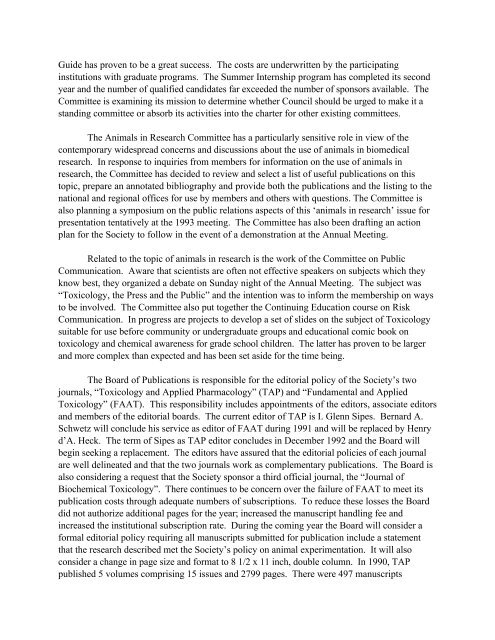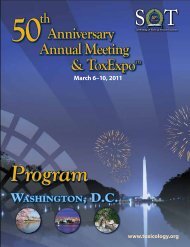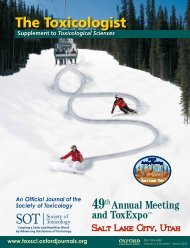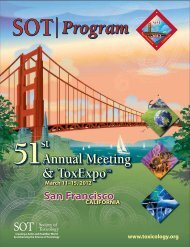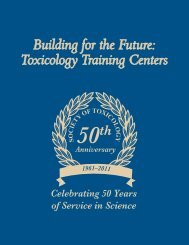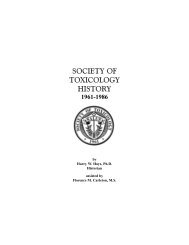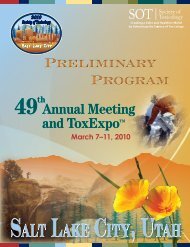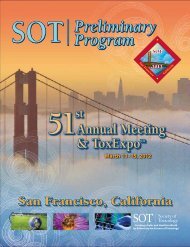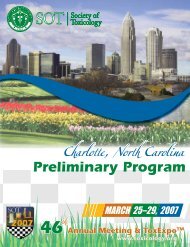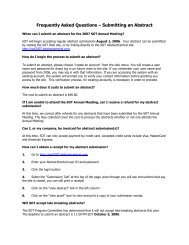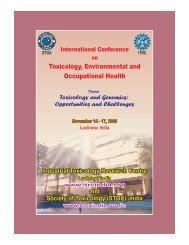SOCIETY O. TOXICOLOGY HISTORY - Society of Toxicology
SOCIETY O. TOXICOLOGY HISTORY - Society of Toxicology
SOCIETY O. TOXICOLOGY HISTORY - Society of Toxicology
Create successful ePaper yourself
Turn your PDF publications into a flip-book with our unique Google optimized e-Paper software.
Guide has proven to be a great success. The costs are underwritten by the participating<br />
institutions with graduate programs. The Summer Internship program has completed its second<br />
year and the number <strong>of</strong> qualified candidates far exceeded the number <strong>of</strong> sponsors available. The<br />
Committee is examining its mission to determine whether Council should be urged to make it a<br />
standing committee or absorb its activities into the charter for other existing committees.<br />
The Animals in Research Committee has a particularly sensitive role in view <strong>of</strong> the<br />
contemporary widespread concerns and discussions about the use <strong>of</strong> animals in biomedical<br />
research. In response to inquiries from members for information on the use <strong>of</strong> animals in<br />
research, the Committee has decided to review and select a list <strong>of</strong> useful publications on this<br />
topic, prepare an annotated bibliography and provide both the publications and the listing to the<br />
national and regional <strong>of</strong>fices for use by members and others with questions. The Committee is<br />
also planning a symposium on the public relations aspects <strong>of</strong> this ‘animals in research’ issue for<br />
presentation tentatively at the 1993 meeting. The Committee has also been drafting an action<br />
plan for the <strong>Society</strong> to follow in the event <strong>of</strong> a demonstration at the Annual Meeting.<br />
Related to the topic <strong>of</strong> animals in research is the work <strong>of</strong> the Committee on Public<br />
Communication. Aware that scientists are <strong>of</strong>ten not effective speakers on subjects which they<br />
know best, they organized a debate on Sunday night <strong>of</strong> the Annual Meeting. The subject was<br />
“<strong>Toxicology</strong>, the Press and the Public” and the intention was to inform the membership on ways<br />
to be involved. The Committee also put together the Continuing Education course on Risk<br />
Communication. In progress are projects to develop a set <strong>of</strong> slides on the subject <strong>of</strong> <strong>Toxicology</strong><br />
suitable for use before community or undergraduate groups and educational comic book on<br />
toxicology and chemical awareness for grade school children. The latter has proven to be larger<br />
and more complex than expected and has been set aside for the time being.<br />
The Board <strong>of</strong> Publications is responsible for the editorial policy <strong>of</strong> the <strong>Society</strong>’s two<br />
journals, “<strong>Toxicology</strong> and Applied Pharmacology” (TAP) and “Fundamental and Applied<br />
<strong>Toxicology</strong>” (FAAT). This responsibility includes appointments <strong>of</strong> the editors, associate editors<br />
and members <strong>of</strong> the editorial boards. The current editor <strong>of</strong> TAP is I. Glenn Sipes. Bernard A.<br />
Schwetz will conclude his service as editor <strong>of</strong> FAAT during 1991 and will be replaced by Henry<br />
d’A. Heck. The term <strong>of</strong> Sipes as TAP editor concludes in December 1992 and the Board will<br />
begin seeking a replacement. The editors have assured that the editorial policies <strong>of</strong> each journal<br />
are well delineated and that the two journals work as complementary publications. The Board is<br />
also considering a request that the <strong>Society</strong> sponsor a third <strong>of</strong>ficial journal, the “Journal <strong>of</strong><br />
Biochemical <strong>Toxicology</strong>”. There continues to be concern over the failure <strong>of</strong> FAAT to meet its<br />
publication costs through adequate numbers <strong>of</strong> subscriptions. To reduce these losses the Board<br />
did not authorize additional pages for the year; increased the manuscript handling fee and<br />
increased the institutional subscription rate. During the coming year the Board will consider a<br />
formal editorial policy requiring all manuscripts submitted for publication include a statement<br />
that the research described met the <strong>Society</strong>’s policy on animal experimentation. It will also<br />
consider a change in page size and format to 8 1/2 x 11 inch, double column. In 1990, TAP<br />
published 5 volumes comprising 15 issues and 2799 pages. There were 497 manuscripts


